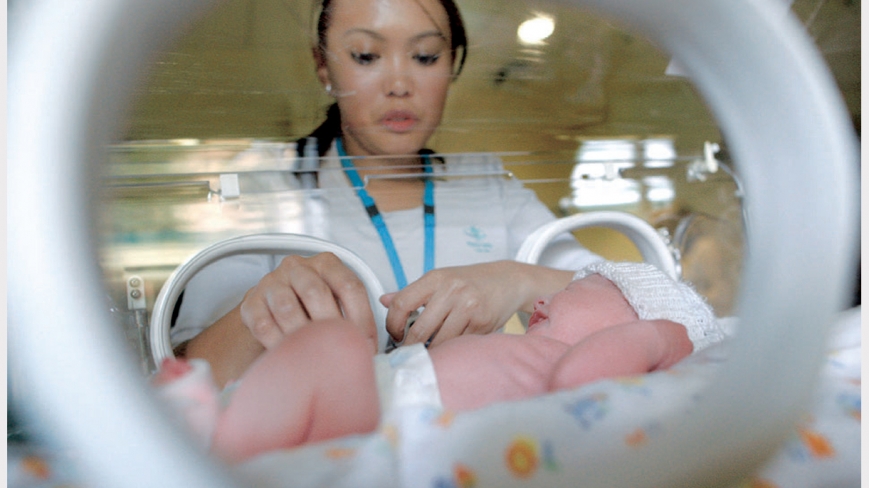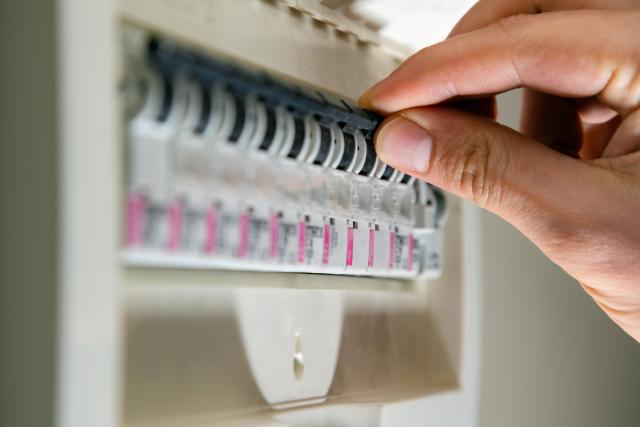The birth of a premature child is an emotional experience and not just for the parents, as Cameron Tait found out.
Sarah Gallagher sat there, waiting and hoping. The young mother and her husband, Dan, kept vigil at the bedside of their newborn daughter, Emma, for what seemed like an eternity. All the excitement and joy experienced by first-time parents had been replaced by fear and uncertainty.
As they looked at Emma hooked up to tubes and machines in the special care nursery at the Royal Women’s Hospital, the Tarneit couple felt a sense of helplessness.
As a ventilator helped Emma breathe, they could only watch as she fought for survival. It was the worst nightmare parents could imagine.
Emma had been delivered premature at just 35 weeks on September 17. She had under-developed lungs and very low blood sugar.
For Sarah, it started out like a typical morning. ‘‘I had just finished vacuuming the floor and was on my way to get a massage,’’ she recalls.
‘‘All of a sudden those plans went out the window because I went into labour.
‘‘When I woke up, I expected my baby to be at my side, but she wasn’t.’’
Emma had been rushed away for urgent medical treatment and Sarah wouldn’t see her until the next day. It would be another two before she could hold Emma for the first time.
‘‘It was quite overwhelming,’’ she says.
‘‘I remember being allowed home and going into the hospital and sitting next to her from six in the morning until 11 at night.
‘‘There was a lot of crying — we were scared. We didn’t know if she was going to come home with us.
‘‘It was lucky we were able to call the nurses 24 hours a day because I would often ring at one in the morning to ask how Emma was going.
‘‘Sometimes I was scared to ask, because if she wasn’t doing well I wouldn’t be able to sleep. But I knew I wouldn’t sleep if I didn’t.’’
When you step inside Werribee Mercy Hospital’s new special-care nursery, it has the warmth and comfort of a living room rather than a cold and clinical medical ward.
This was where Emma was transferred so she could be closer to home and where Sarah was finally able to spend a night alone with her. ‘‘It was daunting,’’ she says.
Linda Mellors, executive director of Mercy Public Hospitals, says the nursery, which provides intensive care to sick and premature babies, was designed with the needs of families in mind. From the soft pastel colours on the walls to the couches in each of the 16 cubicles, it has a warm, soothing feel.
Each cot has a space for a mother to stay by her baby’s side and provisions for both privacy and staff observation.
Dr Mellors says these touches were a simple but effective way to ease the tension and stress facing families.
Every year, more than 2500 mothers give birth at the hospital – a number which continues to grow as more and more young families settle in Wyndham.
Officially opened this month, Werribee Mercy’s $14 million new maternity and neonatal unit includes 16 special-care nursery cots and refurbished labour delivery rooms.
All of the rooms in its expanded 24-bed maternity ward include ensuite bathrooms and a built-in baby bath, while double beds allow fathers to stay overnight with their partner and their newborn.
“Some public maternity wards have up four beds in one room,” Dr Mellors says.
“Our rooms are all singles with double beds in each and that’s what sets us apart.
“Each one is beautifully furnished and very welcoming. Our aim has always been to create a home-like feel.
“Having a baby can be isolating for new fathers as much as new mothers, because they’re usually sent home.
“It’s often very comforting for mothers to have around-the-clock support from partners sharing the load.”
While parents naturally assume all will go to plan with their birth, it naturally comes as a huge shock when it doesn’t, and the baby is delivered prematurely.
“When mothers find themselves in labour at 32 or 34 weeks and delivering a baby which needs emergency care, it causes great stress,” says Dr Mellors. “We try to provide reassurance and normalise the process as much as possible.”
The nursery uses treatments such as CPAP [continuous positive air pressure] to aid breathing for premature babies who are not ready to breathe on their own.
Dr Mellors says the hospital encourages families to treat the special-care nursery as if it were home.
“We give people ownership of the space around the cots, so they can set up picture frames and anything important to them,” she says.
“We also focus on hiding away the scary things in a hospital, so the resuscitation equipment is here, but it’s hidden away in cupboards.
“Working in a special-care nursery doesn’t suit everybody. It can be very emotionally confronting.
“As well as medical skills, our staff have to love being around babies and be able to support families through what is often a very difficult time.
“We work as a team, so if one of our junior staff is having a difficult day or is unable to cope with or manage a situation, our senior staff step in and provide support.”
Jocelyn Benedicto loves the unpredictability of the maternity ward. No two days are ever the same and you never know when you’ll get the next frantic call from an expectant mother.
An obstetrician at Bacchus Marsh and Melton Regional Hospital, which has 11 maternity beds and four birthing suites, she can’t imagine working anywhere else.
Originally from the Philippines, she worked in the Maldives before moving to Australia and starting at Bacchus Marsh five years ago.
The satisfaction of delivering a healthy baby is its own reward.
“There’s no better feeling than seeing the smiling faces of a mother and father moments after their baby is born,” Dr Benedicto says.
Last year, 820 babies were delivered at the hospital.
Midwife Rebecca Jones finished a science degree before she realised nursing was her true calling. She now works alongside Dr Benedicto in the maternity ward at Bacchus Marsh.
“It keeps you on your toes,” she says.
“We can get no births one shift and six the next — it’s always unpredictable.
“There’s never been one day where I haven’t enjoyed coming to work.”
Four weeks after her sudden arrival, Emma is finding her feet.
“She’s sleeping and eating well — she’s thriving,” Sarah says.
‘‘The care our nurses provided was exceptional. They’re very special people.’’
The Weekly would like to thank the staff at Werribee Mercy Hospital and Melton and Bacchus March Regional Hospital for their assistance and co-operation.







